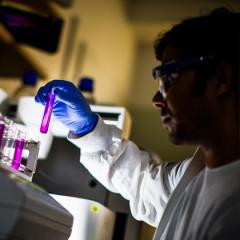Construction is underway on The University of Queensland’s new $60-million Biosustainability Hub, a state-of-the-art facility designed to accelerate the transition to a sustainable global bioeconomy.
Biosustainability Hub Director, Professor Esteban Marcellin from UQ’s Australian Institute for Bioengineering and Nanotechnology (AIBN), said the Hub would help industries achieve net-zero emissions by developing commercially viable biological solutions for fuels, chemicals, materials, and food production from waste.
“The Biosustainability Hub unites researchers and industry partners with different backgrounds, allowing us to validate ideas and develop large-scale projects that tackle real-world industry challenges,” Professor Marcellin said.
Stay on top of our industry news and developments, events and opportunities, by joining The NetworkJoin The Network
"Our expertise is firmly rooted in biological solutions—leveraging synthetic biology, metabolic engineering, and bioprocess development to create sustainable alternatives to fossil fuel-based production.
This diversity of thought and expertise will accelerate the development of sustainable technologies that are both economically and environmentally viable.”
The new floor in the Andrew Liveris building will house two NCRIS-funded facilities—Q-MAP and IDEA Bio—specializing in multi-omics analysis and computational biology to support industry-driven solutions for a circular bioeconomy.
Bioengineering at the Hub includes sustainable mining, extracting rare earth minerals, and waste valorisation, helping industries recover valuable materials while reducing environmental impact. Bioprocess optimization encompasses fermentation scale-up, bioreactor optimisation and engineering, and cell-free enzyme cascades, ensuring efficient and scalable biological production processes. Another core element of the Hub is translational research, bridging fundamental discoveries with industrial applications to ensure that innovations move efficiently from lab to market.
A key feature of the Hub is the construction of a new food-grade pilot-scale laboratory, which will enable researchers and industry partners to test and scale up new biomanufactured products.
The Hub builds upon existing collaborations, including:
- Converting greenhouse gases into sustainable aviation fuel feedstock
- Advancing gas fermentation technologies
- Reducing pollution and recovering critical minerals
- Creating next-generation food ingredients as part of Australia’s Food and Beverage Accelerator (FaBA).
With nearly 20 industry partners, four government partners, and strong domestic and global academic collaborations, the Hub is set to drive transformative change in sustainable manufacturing.
The Hub now has ten research leaders spanning Queensland Alliance for Agriculture and Food Innovation (QAAFI), School of Chemistry and Molecular Biology (SCMB), School of Chemical Engineering, School of Civil Engineering, Australian Institute for Bioengineering and Nanotechnology (AIBN), and School of Agriculture and Food Sustainability (SAFS), providing expertise in gas fermentation, precision fermentation, bioengineering, and bioprocess optimization.
The hub will be located at UQ’s Andrew N. Liveris Building and is open to industry, researchers and governments in Australia and overseas.
The AIBN project is progressing in close collaboration with UQ Properties and Facilities Division, Wilson Architects, ADP Consulting, Wood Consulting, FARA Construction, and the Liveris Infrastructure team to ensure its timely completion by the end of 2025.
Want to learn more about this story or how you can partner with AIBN on ground-breaking research?
Contact us via email: communications@aibn.uq.edu.au
or phone: +61 414 984 324


